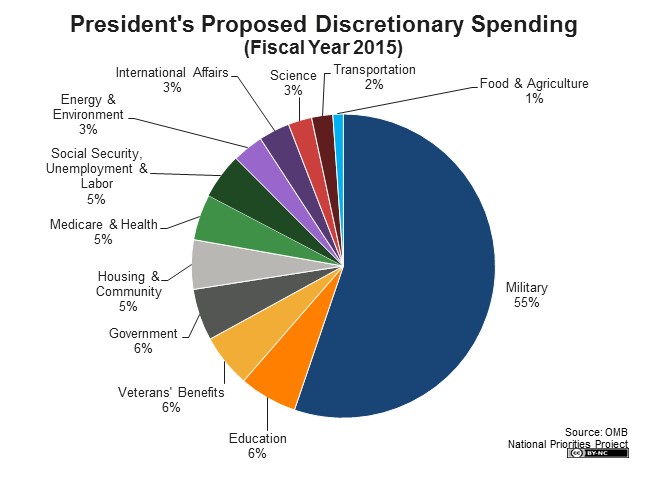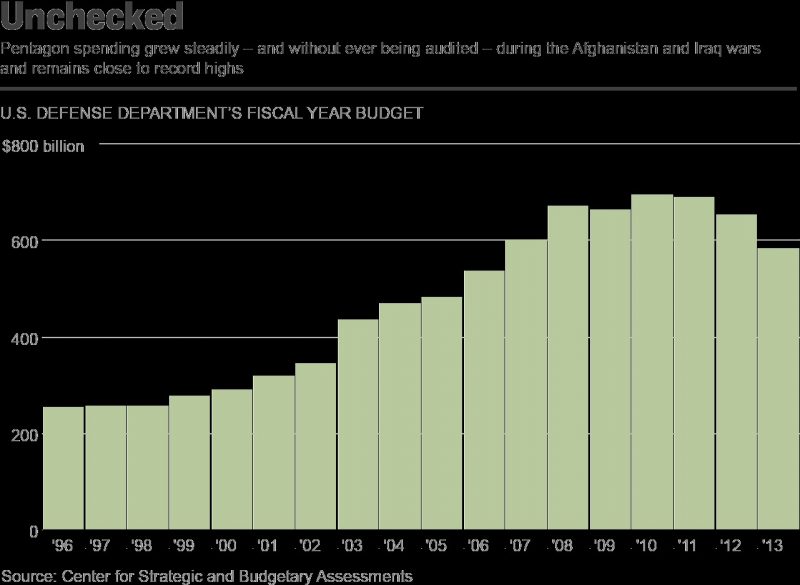



Trillions of dollars in Pentagon spending have just disappeared into thin air. The Pentagon failed its first ever audit last year. There is so much off-the-books spending that no one has a clue where it’s going.
US troops show up in Niger and Congress has no idea how they got there. Is the Pentagon and the military-industrial complex a government unto itself?
By Ron Paul and Daniel McAdams
First published by Ron Paul Institute
A related news from The Fiscal Times
With $8.5 Trillion Unaccounted for, Why Should Congress Increase the Defense Budget?

he U.S. military is good at fighting wars, but it sucks at managing money. Partly because of its convoluted bookkeeping systems, $8.5 trillion—yes, trillion—taxpayer dollars doled out by Congress since 1996 has never been accounted for.
That was also the first year that Congress passed a law requiring the Defense Department to be audited, which it has failed to do. In 2009, Congress passed another law requiring the DOD to be audit-ready by 2017. After spending—no wasting—billions on failed accounting software, the department is likely to miss that deadline, too.
Related: How the Pentagon Cooks the Books to Hide Massive Waste
So how does the military handle their books for the U.S. Treasury department? They cheat.
A scathing investigative report by Reuters in November 2013 described how an accountant at DOD in Cleveland would face the same monthly problem: Missing numbers, wrong numbers — numbers with no explanation of where they came from or what they were for. To rectify the problem, the accountant was instructed to “plug” in false numbers in the DOD’s books.

How can an agency known for superior strategic planning on the battlefield be so incompetent on the home front? Is it arrogance? Sloppiness? Or simply a misplaced disregard for what their lack of discipline is costing the country.
As Reuters reported, a 14-year supply or 15,000 “vehicular control arms” of the military’s Humvees were in stock as of November 2008. Yet, from 2010 through 2012, the agency bought 7,437 more of them — at prices considerably higher than it paid for the thousands sitting on its shelves.

More recently, we have sadly reported just a few of the mounting accounting problems at the Pentagon:
- Pentagon Spends $1 Billion Destroying $16 Billion of Ammo. DOD purchased $16 billion worth of ammunition that it didn’t actually need, according to a Government Accountability Office investigation that found much of the ammo became “obsolete, unusable or their use is banned by international treaty.”
- $80 Million “Iron Man” Suit for Soldiers That Might Not Work. The DOD is pouring millions into a wearable weapon it calls the Tactical Assault Light Operator Suit (TALOS) otherwise known as the “Iron Man” suit. It has a budget so far of $80 million in order to create a suit of armor that soldiers can wear while also being able to carry hundreds of pounds of gear Some scientists are already skeptical and say soldiers would never be able to move around in the heavy armor—let alone carry anything else.
- $300 Million a Year Unaccounted for in Afghanistan. In the latest example of lax oversight, a blistering new report from the Special Inspector General for Afghanistan Reconstruction (SIGAR) reveals the Pentagon isn’t keeping sufficient tabs on the $300 million in tax dollars each year that are supposed to help fund the payroll of the Afghan National Police (ANP).
- U.S. Weapons Worth $500 Million Vanish in Yemen. Pentagon officials cannot track the whereabouts of $500 million worth of military equipment the U.S. donated to Yemen since 2007 – raising alarms that the hardware may have ended up with al-Qaeda or Iranian-backed rebels.
- $1 Billion Paid for Loose Bolts and Damaged Aircraft. It’s bad enough that federal contractors hired to perform routine maintenance work on Customs and Border Patrol (CBP) airplanes dodged their work hours and shirked important safety requirements. It’s even worse that they overcharged the federal government hundreds of millions of dollars for their “work” – and agency officials didn’t notice any of it.
- $700 Million for Afghan Gem Cutters. The Taskforce for Business and Stability Operations, formed in 2010, was supposed to reduce unemployment and fostering economic growth in Afghanistan. But management issues and lax oversight are hampering its effectiveness–leaving millions of tax dollars vulnerable to waste.
- Pentagon Didn’t Report $145 Million in Improper Payments. The Defense Department’s Inspector General estimated that had these claims been included in DoD’s report, the actual amount of improper payments would be closer to about $213 million, or $145 million higher than DoD’s estimate.
- Pentagon Scraps 16 Planes Worth $500 Million for Mere $32K. After spending nearly half a billion dollars on 20 planes to outfit the Afghan Air Force, the Defense Department turned around and scrapped 16 of the aircraft for 6 cents on the pound—just $32,000, the Special Inspector General for Afghanistan Reconstruction has learned.
- $900 Million More in Outrageous Military Spending. In the latest blow to the program, the Government Accountability Office released a scathing review of newly built ships that just joined the fleet—ships that together cost nearly $900 million more than originally estimated.
What should Congress do? Continue to blithely increase the defense budget when the department can’t handle money? Call in Ernst and Young to do it for them? Or simply tell them they won’t get another red cent until they figure out how to add and subtract.
At a time when the country is facing entitlement cuts and desperately trying to not just repair but invest in new state of the art infrastructure, shouldn’t the agency with the largest federal budget justify what it spends and why? At the very least, if DOD doesn’t pass an audit, it should be penalized—just like you and me.
By Jacqueline Leo and Brianna Ehley
The above-related article was originally published by The Fiscal Times in March 19, 2015
The 21st Century
